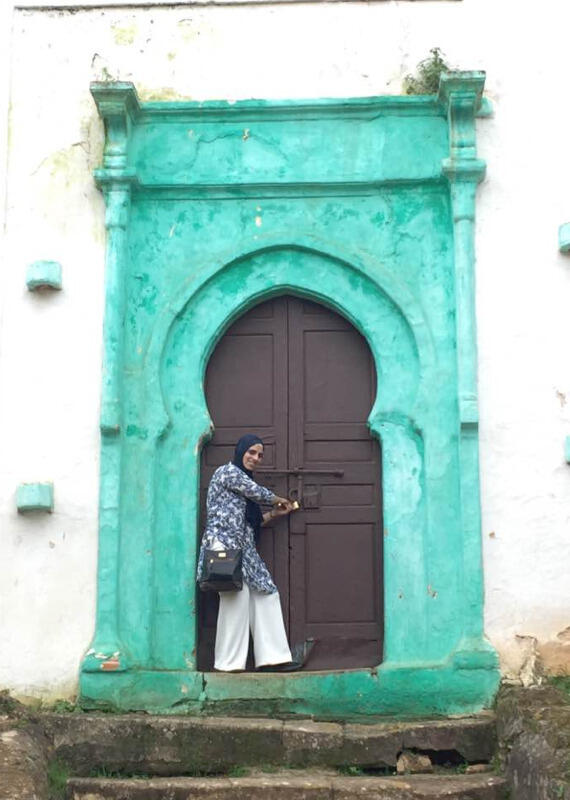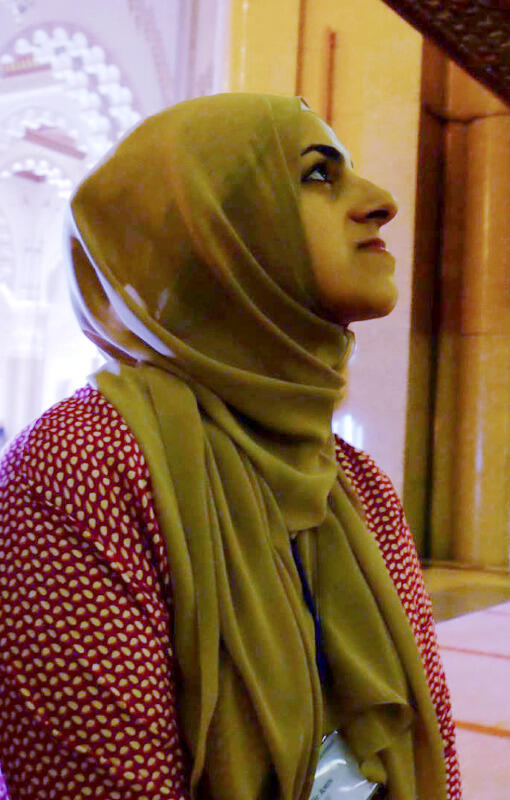April 27, 2017
Fulbright recipient Fajir Amin studies benefits of ‘looping’ in United Arab Emirates classrooms
Share this story

In 2014, Fajir Amin arrived in the United Arab Emirates to teach English, and was assigned to teach fourth-grade boys at a school on the remote Arabian Gulf island of Dalma. To get there, Amin had to undergo a seven-hour journey from the capital city of Abu Dhabi, and had no idea what to expect.
“Initially I was glad about [being assigned a fourth-grade boy’s English class], as I had taught fourth grade before in the United States, and liked that age group,” said Amin, who received a master’s degree in elementary education in 2012 from the VCU School of Education and taught in Virginia for two years. “However, when people on the island and co-workers asked what grade I had been given to teach, I only got two reactions from people: They would either laugh and chuckle or they would have a somber look on their face and say something like ‘Aww, you poor darling!’”
As it turned out, the students in Amin’s class had a total of five different English teachers the previous year, due to how “rough” the students were and because of the teachers’ inability to cope with conditions on the island.
“Clearly, my students had not experienced commitment for a while and were expecting me to pack my bags and run for the next ferry bound to the mainland,” she said. “I saw a bunch of kids that just needed an advocate and consistent leader.”
I saw a bunch of kids that just needed an advocate and consistent leader.
The boys pranked her frequently, messing with her water main, ringing her doorbell at odd hours of the night and running away, and engaging in all manner of classroom antics. Eventually, however, as the students and their families got to know her, Amin’s class settled into a “very choppy and offbeat, yet, nevertheless, and for all intents and purposes, a rhythm.
“It took such a long time to get a semblance of normalcy or to establish what ‘normal’ was for us as a group,” she said. “So much so, that when the school year neared the end, I approached my principal and requested to loop with my students the upcoming year.”
The principal agreed — though not without telling Amin: “Maybe you are brave, maybe you are crazy!” — and Amin went on to teach the same cohort of students again in the fifth grade.
“When I returned for my second year of teaching on the island, the dynamic between myself and the boys was notably positive,” she said. “We still had some rough times, by default from the environment we were immersed in, but, overall, we had some legendary experiences.”
Having seen firsthand how “looping” benefited her students, Amin applied to the U.S. Fulbright Student Program to conduct a study on the effects of looping on the aptitude and attitude of students toward English language acquisition among elementary students in the United Arab Emirates.
Amin was one of a record-breaking 11 scholars from VCU who received Fulbright awards for 2016–17, the most of any college or university in Virginia.
Studying the effects of looping in the UAE has so far proved challenging, as the practice is highly rare; there is not even an exact word for it in Arabic.
“It has been hard to locate looping classes and willing subjects for the research,” she said. “However, I am content with the participation I have experienced thus far, and my hope is to get the most out of these sample pools.”
Her hope, she said, is to observe the looping classrooms and build on her own personal experience with the practice. Among the questions Amin hopes to answer with her study are:
- Does looping effect the attitude of a student toward language acquisition and learning in general?
- How do parents and members of the community view the idea of looping?
- What are the experiences and views held by administrations and leadership regarding looping?
- How often is looping practiced?
- Are the looping experiences, if any, positive or negative?
- What are some examples regarding looping that teachers, students, school leadership or community members have to share and contribute?
- Does anyone have standard testing data from looping classes vs. non-looping classes? How do they compare?
“Looping is not an easy choice; it never is,” Amin said. “It takes a lot out of a teacher to change grade levels, new lesson plans, follow-up on long-term plans to name just a few [challenges], and that is not counting forgoing a mental break from groups or individual students. If a teacher decides to loop, they are asking for more work, and dedicating to a commitment that takes a toll on one emotionally, mentally and at times even physically.”
Amin credits her Fulbright experience to the boys on the island of Dalma.
“Without them, without the challenges we faced and overcame together, I would never have had the idea to even apply for the Fulbright in the first place,” she said. “I applied because I believed that they had such a blessing and positive energy in them that must in a way ripple across the Arabian Gulf and translate into a building block to contribute to the educational reform in the UAE.”
Even though the students were isolated on an island far from the country’s capital, it did not mean that they could not play a role in shaping policy affecting schoolchildren across the country, she said.
“Perhaps this research inspired by their free, generous and incredible little souls will somehow one day become part of the general rhythm of the educational process in the UAE,” she said.
Amin’s studies at VCU prepared her for her work in the UAE by drilling into her to be a “reflective practitioner,” she said.

“Honestly, that was the biggest and most valuable way in which the school of education prepared me to face the challenges that came my way,” she said. “Without being a reflective practitioner, I would have never got the idea in the first place to apply for the research.”
She added that she has received a great deal of support from VCU’s Honors College, as well as from her professional mentor, Joan Rhodes, Ph.D., associate professor of teaching and learning in the School of Education, who has played a pivotal role in inspiring her and helping her to navigate challenges.
Rhodes, who first met Amin while teaching a course on diagnostic and remedial reading, called Amin a phenomenal person.
“She’s a bridge builder between people, whether that’s in her college classes or in her position as a Fulbright scholar, as a teacher in the classroom, or in her future work,” Rhodes said. “The fact that she can walk between two worlds is really helpful to people who know her. And she’s just tremendously open and kind and very passionate about her desire to make the world a better place.”
In the future, Amin hopes to continue to influence education policy in the Middle East and around the globe at the macro level, and she also plans to possibly pursue a doctorate in education.
Lately, she said, her Fulbright work has led her to reflect on the importance of leadership, particularly in schools.
“My last principal was Ms. Sanaa Izzuddin, a Syrian woman, tiny in build, yet a giant of character and good will and energy,” she said. “I learned from her that as long as you don’t lose sight of the end goal in mind, then your ship of life and mission will always find its true north.”
The example of Izzuddin and other leaders has reminded her that “one must never compromise their ability to be of influence to the best of their humanity.”
“Teaching is not easy and is not nearly appreciated as it should be,” she said. “However, [a teacher’s] position within a classroom is a position of immense power, even on the days that you feel powerless. Showing up to work on a school day for a child translates into you showing up in the particles of ink writing the future histories of nations.”
Amin worked with the National Scholarship Office at VCU to apply for the Fulbright Student Scholarship. The office provides support for VCU alumni, graduate students and undergraduates who wish to compete for prestigious national and international scholarships. Interested students and alumni can contact the office at natlscholar@vcu.edu or 804-828-6868.
Subscribe to VCU News
Subscribe to VCU News at newsletter.vcu.edu and receive a selection of stories, videos, photos, news clips and event listings in your inbox.










